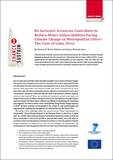|
By Rommy K. Torres Molina and Liliana Miranda Sara
En Español: ¿Escenarios inclusivos reducen vulnerabilidades del agua frente al Cambio Climático en ciudades metropolitanas? El caso de Lima, Perú How do cities face uncertain water and hydro-energetic risks in front of Climate Change? This question has a complex answer since it is necessary, first at all, to understand the links and interactions between water, territory and metropolitan city in terms of the relationship between water governance and territory (urban and rural). Secondly, how do these interactions link with citizen participation and how effective and articulated are multi-actor processes within and between levels of government (national, regional, provincial and district)? Does the institutional framework permit to articulate and integrate interventions in different territorial scales (basin, metropolitan city, neighborhood, and house levels)? Are these spaces sufficient and efficient for facilitating this interaction and integration in order to reduce water vulnerabilities facing Climate Change scenarios to 2050? All these questions are formulated in the context a metropolitan city like Lima in Peru. |
Recent Chance2Sustain Publications |
|
|
|
|
|

